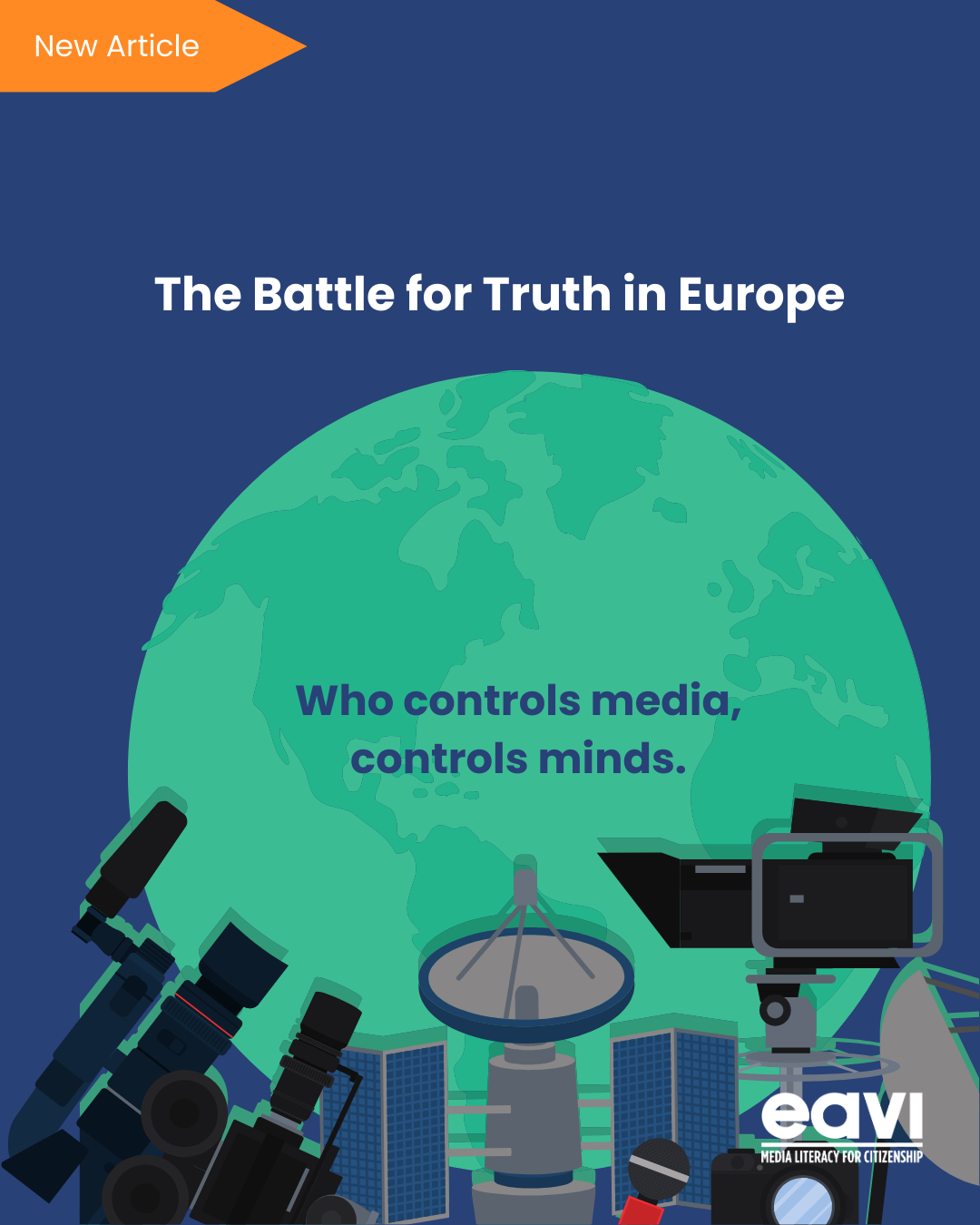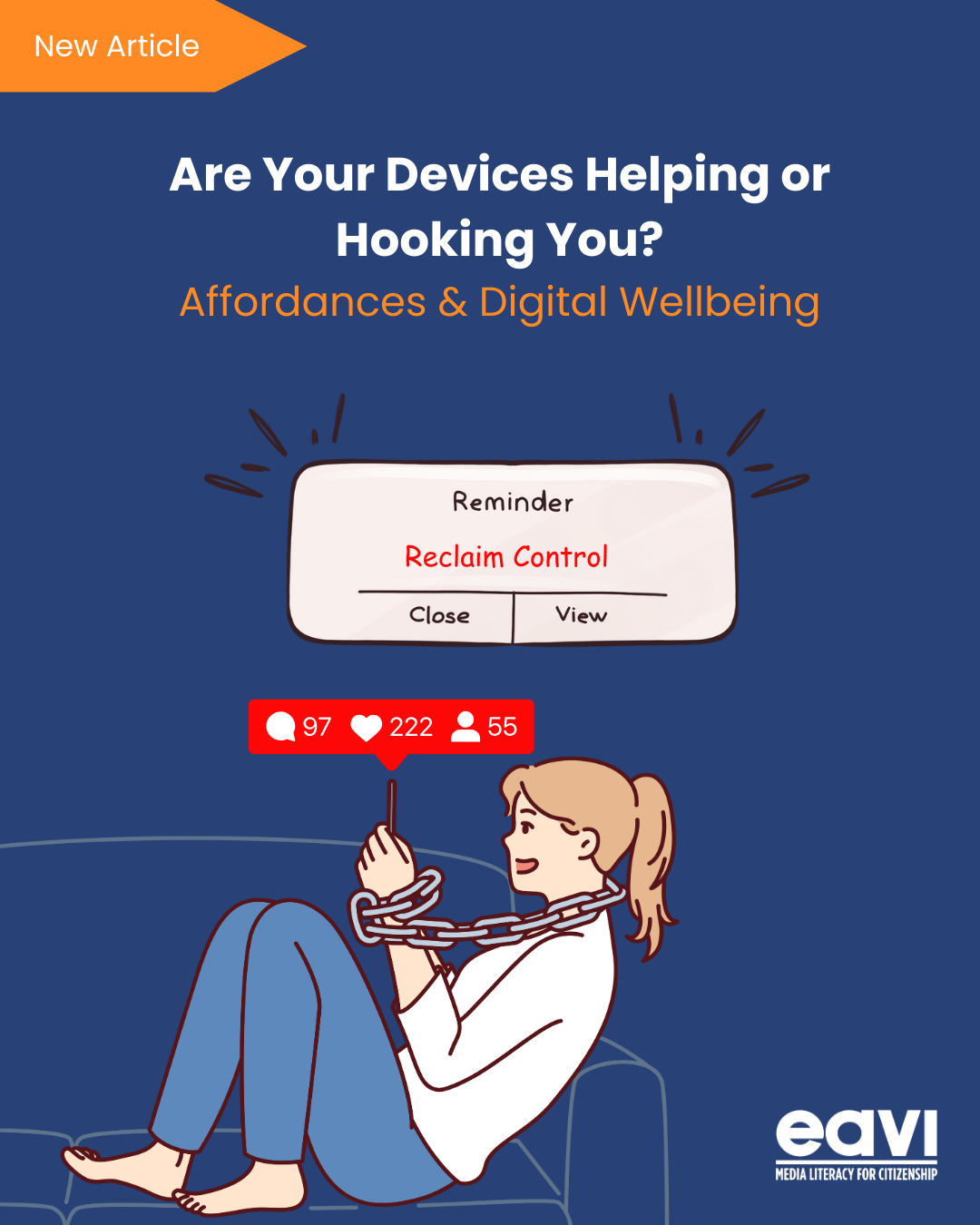Have you ever asked yourself about your political orientation? Do you know who to vote for in European, national or local elections? Where do you collect information to form your political opinion?
No wonder all these questions are important during elections in the era of social media, because they determine, directly (as in the case of your political orientation, if clearly shown), or indirectly (as in the case of your sources of information), if you are likely to be the target of specific political messages on social platforms and online.
Despite the awareness of political propaganda invading social media in the pre-election period, it is difficult to evaluate whether our political opinion and consequent vote depend on our conscious decision, or they have been influenced by political messages accidentally seen on online platforms. How can we make sure our vote is a genuine reflection of what we really believe? Simple as it is, we should pay extra attention to what happens in our virtual life, rather than in everyday normal life. Political propaganda, indeed, has the aim to influence our perceptions about the candidates presenting themselves in the next elections and to make us decide on candidates not really of our own choosing.
Political advertisement can be subliminal and and sophisticated, using different tricks we may know or instead never heard about. One of the simplest method used is the manipulation of social media, altering the number of followers by creating fake accounts, in order to affect viewers’ conclusion about a specific candidate’s popularity.
Other than this, other strategies of manipulation used in pre-election period are called BOMBS. Whether the name comes from their effectiveness or the wide range of people they can reach, it is not sure. Their pervasiveness is indisputable.
Here the list of some of the most common ones:
- Google bombs: this instrument makes possible that a user, looking for the best recipe for a cupcake through the search engine, will also see among the top 10 search results something completely unrelated to cupcakes, which maybe regards the upcoming elections. This became an issue in 2006, when looking for “miserable failure”, the name of G. W. Bush appeared. It appears now the danger of a Google bomb has slightly decreased due to some changes in the algorithm;
- Twitter bombs: in this case the users receive unsolicited replies in order to have their attention regarding a particular issue or subject. Obviously, targeted people are not chosen randomly, but are among the ones who had been active in the previous hours in discussing political matters or elections.
- Ads bombs: they can be either sponsored contents or promoted tweets that appear when a user is looking for a candidate name on the platforms and which lead people to click on them. All of a sudden, you will be transferred to a page or website supporting the opponent candidate.
These are just some of the means used, so the list is not complete.
What is of interest in this period, due to the upcoming European elections, is: are people concerned about what has been said before? Do they think social media should follow the rules observed by traditional media about political campaigning?
A Eurobarometer statistic has analyzed these aspects in 2018, asking for a sample in different Member States if rules applicable to traditional mass media should also apply to social media. The main findings were that 81% of the respondents were in favour of the application of some principles to online social media, for example transparency (making clear what content and publications are online advertisements and who is paying for them), and equal opportunities to access online services to compete for voters’ attention. What is striking looking at the report is that people are concerned about disinformation, censorship online during the pre-election period but above all about their personal data used to target the political message they see, undermining free and fair competition between all political parties. It also came out that people worrying about these issues are just the ones who participate in political debates online, mainly educated, and who place themselves at the right or left wing, rather than the ones in the centre.
The rest does not participate either because it considers the participation a waste of time or due to the absence of trust in social networks, since the language and tone used in online debates are often violent and they are poorly moderated or not moderated enough.
Summarizing what has been said, it is possible to affirm that nowadays social media account for most of the spending of major parties (according to the data diffused by the Electoral Commission in UK), but why? It seems that social media advertisement is more cost effective than other less smart forms of advertising.
The shift to social media poses some serious potential concerns for election legitimacy, and due to the lack of legislation and constraints towards online platforms, our only way to protect ourselves is to be aware how these things work and be prepared to search for the truth behind the messages.
For further information:
C. Petermann, The Twitter underground economy: A blooming business (2012)
Google bomb, Wikipedia (2012)
Gayo-Avello, A meta-analysis of state-of-the-art electoral prediction from Twitter data
- Moore, D. Tambini, Digital dominance. The power of Google, Amazon, Facebook and Apple, chap. Social media power and election legitimacy, 2018.
https://www.electoralcommission.org.uk/our-work/our-research/electoral-data
Have you ever asked yourself about your political orientation? Do you know who to vote for in European, national or local elections? Where do you collect information to form your political opinion?
No wonder all these questions are important during elections in the era of social media, because they determine, directly (as in the case of your political orientation, if clearly shown), or indirectly (as in the case of your sources of information), if you are likely to be the target of specific political messages on social platforms and online.
Despite the awareness of political propaganda invading social media in the pre-election period, it is difficult to evaluate whether our political opinion and consequent vote depend on our conscious decision, or they have been influenced by political messages accidentally seen on online platforms. How can we make sure our vote is a genuine reflection of what we really believe? Simple as it is, we should pay extra attention to what happens in our virtual life, rather than in everyday normal life. Political propaganda, indeed, has the aim to influence our perceptions about the candidates presenting themselves in the next elections and to make us decide on candidates not really of our own choosing.
Political advertisement can be subliminal and and sophisticated, using different tricks we may know or instead never heard about. One of the simplest method used is the manipulation of social media, altering the number of followers by creating fake accounts, in order to affect viewers’ conclusion about a specific candidate’s popularity.
Other than this, other strategies of manipulation used in pre-election period are called BOMBS. Whether the name comes from their effectiveness or the wide range of people they can reach, it is not sure. Their pervasiveness is indisputable.
Here the list of some of the most common ones:
- Google bombs: this instrument makes possible that a user, looking for the best recipe for a cupcake through the search engine, will also see among the top 10 search results something completely unrelated to cupcakes, which maybe regards the upcoming elections. This became an issue in 2006, when looking for “miserable failure”, the name of G. W. Bush appeared. It appears now the danger of a Google bomb has slightly decreased due to some changes in the algorithm;
- Twitter bombs: in this case the users receive unsolicited replies in order to have their attention regarding a particular issue or subject. Obviously, targeted people are not chosen randomly, but are among the ones who had been active in the previous hours in discussing political matters or elections.
- Ads bombs: they can be either sponsored contents or promoted tweets that appear when a user is looking for a candidate name on the platforms and which lead people to click on them. All of a sudden, you will be transferred to a page or website supporting the opponent candidate.
These are just some of the means used, so the list is not complete.
What is of interest in this period, due to the upcoming European elections, is: are people concerned about what has been said before? Do they think social media should follow the rules observed by traditional media about political campaigning?
A Eurobarometer statistic has analyzed these aspects in 2018, asking for a sample in different Member States if rules applicable to traditional mass media should also apply to social media. The main findings were that 81% of the respondents were in favour of the application of some principles to online social media, for example transparency (making clear what content and publications are online advertisements and who is paying for them), and equal opportunities to access online services to compete for voters’ attention. What is striking looking at the report is that people are concerned about disinformation, censorship online during the pre-election period but above all about their personal data used to target the political message they see, undermining free and fair competition between all political parties. It also came out that people worrying about these issues are just the ones who participate in political debates online, mainly educated, and who place themselves at the right or left wing, rather than the ones in the centre.
The rest does not participate either because it considers the participation a waste of time or due to the absence of trust in social networks, since the language and tone used in online debates are often violent and they are poorly moderated or not moderated enough.
Summarizing what has been said, it is possible to affirm that nowadays social media account for most of the spending of major parties (according to the data diffused by the Electoral Commission in UK), but why? It seems that social media advertisement is more cost effective than other less smart forms of advertising.
The shift to social media poses some serious potential concerns for election legitimacy, and due to the lack of legislation and constraints towards online platforms, our only way to protect ourselves is to be aware how these things work and be prepared to search for the truth behind the messages.
For further information:
C. Petermann, The Twitter underground economy: A blooming business (2012)
Google bomb, Wikipedia (2012)
Gayo-Avello, A meta-analysis of state-of-the-art electoral prediction from Twitter data
- Moore, D. Tambini, Digital dominance. The power of Google, Amazon, Facebook and Apple, chap. Social media power and election legitimacy, 2018.
https://www.electoralcommission.org.uk/our-work/our-research/electoral-data
Have you ever asked yourself about your political orientation? Do you know who to vote for in European, national or local elections? Where do you collect information to form your political opinion?
No wonder all these questions are important during elections in the era of social media, because they determine, directly (as in the case of your political orientation, if clearly shown), or indirectly (as in the case of your sources of information), if you are likely to be the target of specific political messages on social platforms and online.
Despite the awareness of political propaganda invading social media in the pre-election period, it is difficult to evaluate whether our political opinion and consequent vote depend on our conscious decision, or they have been influenced by political messages accidentally seen on online platforms. How can we make sure our vote is a genuine reflection of what we really believe? Simple as it is, we should pay extra attention to what happens in our virtual life, rather than in everyday normal life. Political propaganda, indeed, has the aim to influence our perceptions about the candidates presenting themselves in the next elections and to make us decide on candidates not really of our own choosing.
Political advertisement can be subliminal and and sophisticated, using different tricks we may know or instead never heard about. One of the simplest method used is the manipulation of social media, altering the number of followers by creating fake accounts, in order to affect viewers’ conclusion about a specific candidate’s popularity.
Other than this, other strategies of manipulation used in pre-election period are called BOMBS. Whether the name comes from their effectiveness or the wide range of people they can reach, it is not sure. Their pervasiveness is indisputable.
Here the list of some of the most common ones:
- Google bombs: this instrument makes possible that a user, looking for the best recipe for a cupcake through the search engine, will also see among the top 10 search results something completely unrelated to cupcakes, which maybe regards the upcoming elections. This became an issue in 2006, when looking for “miserable failure”, the name of G. W. Bush appeared. It appears now the danger of a Google bomb has slightly decreased due to some changes in the algorithm;
- Twitter bombs: in this case the users receive unsolicited replies in order to have their attention regarding a particular issue or subject. Obviously, targeted people are not chosen randomly, but are among the ones who had been active in the previous hours in discussing political matters or elections.
- Ads bombs: they can be either sponsored contents or promoted tweets that appear when a user is looking for a candidate name on the platforms and which lead people to click on them. All of a sudden, you will be transferred to a page or website supporting the opponent candidate.
These are just some of the means used, so the list is not complete.
What is of interest in this period, due to the upcoming European elections, is: are people concerned about what has been said before? Do they think social media should follow the rules observed by traditional media about political campaigning?
A Eurobarometer statistic has analyzed these aspects in 2018, asking for a sample in different Member States if rules applicable to traditional mass media should also apply to social media. The main findings were that 81% of the respondents were in favour of the application of some principles to online social media, for example transparency (making clear what content and publications are online advertisements and who is paying for them), and equal opportunities to access online services to compete for voters’ attention. What is striking looking at the report is that people are concerned about disinformation, censorship online during the pre-election period but above all about their personal data used to target the political message they see, undermining free and fair competition between all political parties. It also came out that people worrying about these issues are just the ones who participate in political debates online, mainly educated, and who place themselves at the right or left wing, rather than the ones in the centre.
The rest does not participate either because it considers the participation a waste of time or due to the absence of trust in social networks, since the language and tone used in online debates are often violent and they are poorly moderated or not moderated enough.
Summarizing what has been said, it is possible to affirm that nowadays social media account for most of the spending of major parties (according to the data diffused by the Electoral Commission in UK), but why? It seems that social media advertisement is more cost effective than other less smart forms of advertising.
The shift to social media poses some serious potential concerns for election legitimacy, and due to the lack of legislation and constraints towards online platforms, our only way to protect ourselves is to be aware how these things work and be prepared to search for the truth behind the messages.
For further information:
C. Petermann, The Twitter underground economy: A blooming business (2012)
Google bomb, Wikipedia (2012)
Gayo-Avello, A meta-analysis of state-of-the-art electoral prediction from Twitter data
- Moore, D. Tambini, Digital dominance. The power of Google, Amazon, Facebook and Apple, chap. Social media power and election legitimacy, 2018.
https://www.electoralcommission.org.uk/our-work/our-research/electoral-data








































































































































































